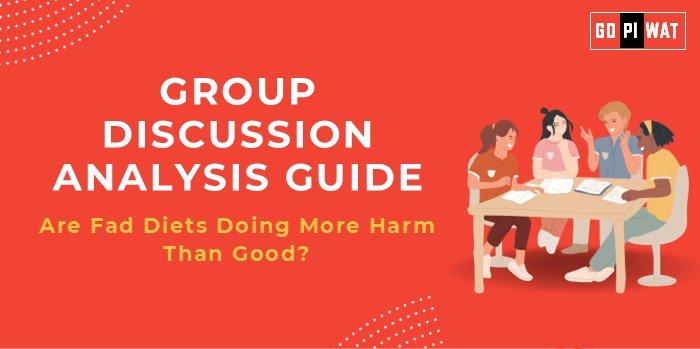📋 Group Discussion Analysis Guide: Are Fad Diets Doing More Harm Than Good?
🌐 Introduction to the Topic
Opening Context: Fad diets, with promises of rapid weight loss and health benefits, are a popular trend globally. However, their long-term impact on physical and mental well-being is increasingly questioned.
Topic Background: The term “fad diets” refers to popular dietary patterns that often promise drastic results within short durations. Originating from quick-fix culture and amplified by social media influencers, these diets have a history of recurring popularity despite scientific skepticism. Prominent examples include keto, paleo, and juice cleanses.
📊 Quick Facts and Key Statistics
- 💰 Market Growth: The global weight loss and diet control market is valued at $254 billion as of 2024, reflecting massive consumer interest.
- 📉 Diet Failure Rates: Research shows 80-90% of people who lose weight on a fad diet regain it within a year.
- ⚠️ Health Risks: Studies associate extreme diets with metabolic slowdown and micronutrient deficiencies.
- 📱 Social Influence: A 2023 study revealed 70% of fad diet adopters were influenced by social media trends.
👥 Stakeholders and Their Roles
- 🩺 Healthcare Providers: Provide scientific advice and caution against unsustainable dietary habits.
- 🏢 Dietary Brands: Innovate and market diets, often exploiting trends.
- 🏛️ Government Bodies: Regulate claims in advertisements and promote balanced nutrition.
- 🛍️ Consumers: Seek quick results, often prioritizing appearance over health.
🏆 Achievements and Challenges
Achievements:
- 📈 Awareness Increase: Popular diets have introduced concepts like low-carb eating to broader audiences.
- ✨ Short-Term Weight Loss: Effective for rapid weight loss before events or medical procedures.
- 🌱 Innovation in Food Industry: New food products like keto-friendly snacks have emerged to cater to these trends.
Challenges:
- 🔄 Long-Term Sustainability: Most fad diets are difficult to maintain, leading to a rebound effect.
- ⚠️ Health Consequences: Cases of malnutrition, hormonal imbalances, and eating disorders are linked to extreme dieting.
- 🧠 Social and Psychological Impact: Unrealistic body standards perpetuated by these diets contribute to poor self-esteem.
🌍 Global Comparisons:
- 🇬🇷 Success in Mediterranean Countries: Emphasis on balanced diets rich in fresh produce, olive oil, and moderate wine intake is sustainable and health-promoting.
- 🇺🇸 Challenges in Western Diets: Heavy reliance on processed foods and quick fixes like fad diets exacerbates health issues.
📖 Case Study:
The popularity of the Atkins diet in the early 2000s showed initial success but resulted in criticisms over its impact on heart health due to high saturated fat consumption.
📚 Structured Arguments for Discussion
- ✅ Supporting Stance: “Fad diets can offer a structured path for those struggling with traditional methods, encouraging them to take the first steps toward healthier eating.”
- ❌ Opposing Stance: “The unsustainable nature of fad diets often leads to rebound weight gain and worsened health outcomes.”
- ⚖️ Balanced Perspective: “While some aspects of fad diets promote awareness of healthier eating, their overall impact on long-term health remains questionable.”
🎯 Effective Discussion Approaches
- 💡 Opening Approaches:
- Statistical Start: “Did you know 80-90% of people on fad diets regain their weight within a year? This raises questions about their sustainability.”
- Contrast Start: “While a keto diet may promise rapid weight loss, the long-term effects on heart health remain debated.”
- 🛠️ Counter-Argument Handling: Recognize the short-term benefits but highlight the health risks with evidence, e.g., “While rapid weight loss is possible, studies show that these diets may lead to metabolic issues.”
🔍 Strategic Analysis of Strengths and Weaknesses
Strengths:
- 🚀 Short-term effectiveness.
- 📚 Increased dietary awareness.
Weaknesses:
- 📉 Lack of long-term adherence.
- ⚠️ Potential health risks.
Opportunities:
- 🌍 Promoting sustainable and evidence-based diets.
Threats:
- 📣 Proliferation of misinformation and harmful diet trends.
🎓 Connecting with B-School Applications
- 🌟 Real-World Applications: Projects analyzing consumer behavior in health industries or designing sustainable diet campaigns.
- ❓ Sample Interview Questions:
- “How would you address the misinformation spread by fad diet trends?”
- “Can fad diets have a place in addressing global obesity?”
- 📘 Insights for Students: Emphasize critical evaluation of trends and their psychological and economic impacts on consumers.


